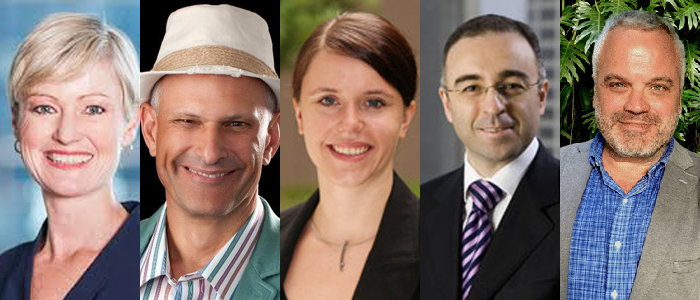The next big shock: what investors should be doing now
The longer-term risks are well-enough known, according to the speakers at last Friday’s Portfolio Construction Forum (August 14) virtual conference. The problem is they are not getting a lot of attention. COVID-19 is both a wake-up call and a reason we have recently become so short-term focused. What starts out looking like a non-financial risk can very quickly turn into one.
The conference, convened by Portfolio Construction Forum’s Graham Rich, was called ‘The Next Big Shock’ and was part of the investor education firm’s ‘All Things Considered’ series of discussions. It attracted 340 attendees, which was a record for the series. Speakers were: Kylie Willment, the CIO for Australia and the Pacific region at Mercer; Martina Linnenluecke, the Professor of Environmental Finance at the Macquarie Business School; Joe Fernandes, principal of the GQF Group; and, Rob Prugue, principal consultant at Callidum Investment Research.
Their main theme was that attention to the big, systemic, long-term risks for investors and/or society as a whole, was tending to be swamped by what’s happening around the world with COVID right now. But these big, systemic, long-term risks, such as the impact of climate change, are still happening and still need to be addressed.
Willment referred to the publication last year of the World Economic Forum’s survey on risks, which were assessed on both likelihood and impact. That had “infectious diseases” ranked relatively low in likelihood. The highest risks in both likelihood and impact included: climate change; extreme weather; natural disasters; and cyber-security. Lower risks included inflation, deflation, fiscal problems and unemployment.
“Maybe those rankings would have changed if they did the survey today,” Willment said. “We are focusing on shorter-term risks.” Something that climate change, water security, geopolitical risks, technological change, cyber risks and low interest rates etc. have in common are that they all lack standard measurements. “We probably put them in the ‘too-hard basket’, because there is no playbook and they are all inherently forward looking,” she said.
“We lack confidence in framing up a financial case… And maybe there’s a lack of confidence in how they align with our fiduciary duty… I believe it is incumbent on us to work out how this fits in with our longer-term problems. We need to better to try to understand the risks. There is a very strong role for collaboration among investors.” Rich added that COVID should be a wake-up call because it was an existential shock with a big impact, but there were other risks that needed to be considered.
According to Macquarie University’s Martina Linnenluecke, investors need to pay more attention to all global risks. “The World Economic Forum has been putting up these reports for years and we have probably not been paying attention. COVID shows us that we should,” she said. “With climate change we have a lot of science and we have a time horizon. It will start to hit within a decade. It will happen in our lifetime. The science is very very clear. And we know the impacts will not be equal (between geographies and populations).”
Unlike some of the other major perceived risks, scientists, analysts and investors can contribute to good estimates of carbon content and risks in a portfolio, as well as the assets with high risk exposure, such bas where they sit regionally. But a lot of the other risks, identified by the World Economic Forum and other sources, are not very well quantified.
Joe Fernandes asked: “What is the extent of fiduciary responsibilities? I would think they are quite high, but our engagement is quite low. We need to extend our field of vision beyond what we known and can model. Maybe we haven’t calibrated the risks properly,” he said. “And this is coming at us as a financial and economic issue, not as an ESG issue, just as COVID came at us now as a financial issue. Is this negligent avoidance?”
He also pointed out, in discussion with Rob Prugue, that the rewards for assessing these risks were asymmetrical. You are not rewarded for a “near miss”. Prugue said that, if you take the ‘Y2K’ experience as an example, where in the lead up to the turn of the century “many smart people” assessed the possibilities of a computer meltdown as a big risk. “Many people took money out of the market and later regretted it,” Prugue said.
On “peer risk”, which is often discussed by both managers and their big clients, Kylie Willment said that this could be both an inhibitor of taking action against risks and a benefit, meaning the tendency to act as a herd was good when the heard was heading for safety but not so good when it was going in the wrong direction. “Rarely do we go longer than three or five years when considering peer risk,” she said. “There’s a fear of doing the right thing over the long term but acting too early and blowing up shorter-term performance.” As Prugue said: “Systemic risk is borne by all. Peer risk is borne by one.”
Graham Rich says in his background notes for the series of discussions: “Crises can be useful, highlighting our investing strengths and weaknesses. What we do with this information determines whether portfolios survive or thrive during the dislocation and in the post-crisis environment. Our weekly live and on-demand ‘All Things Considered’ ‘zoominar’ series explores and challenges the paradigms and assumptions underpinning our investing activities, focusing on those most consequential to investment outcomes.
“Questioning our assumptions is fundamental to ensuring long-term, sustainable investing success – but it is challenging. People living in a system often cannot conceive of a different world. Yet the Covid-19 pandemic has created a global health and economic crisis that is unprecedented in speed, breadth, scope and reaction – there is a growing realisation that this is a whole new world…”
– G.B.










